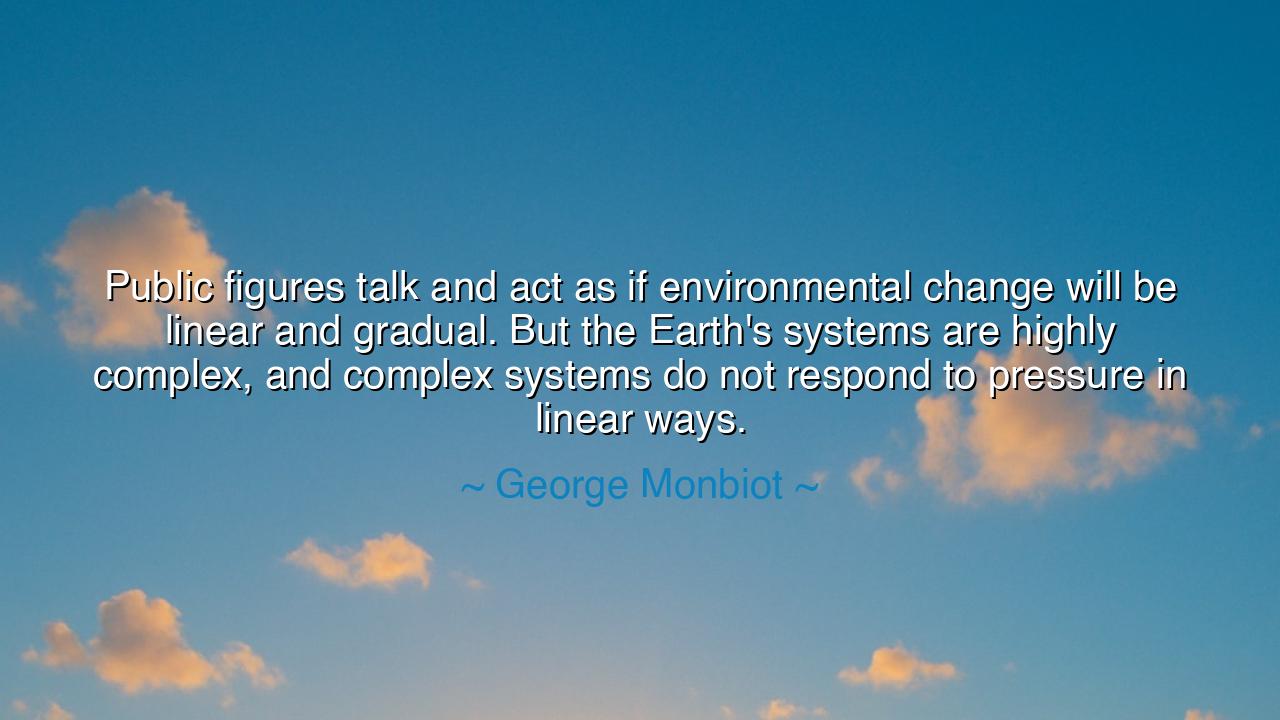
Public figures talk and act as if environmental change will be
Public figures talk and act as if environmental change will be linear and gradual. But the Earth's systems are highly complex, and complex systems do not respond to pressure in linear ways.






Hear the solemn voice of George Monbiot: “Public figures talk and act as if environmental change will be linear and gradual. But the Earth’s systems are highly complex, and complex systems do not respond to pressure in linear ways.” This is no idle observation, but a warning carved from wisdom and sharpened by urgency. It reminds us that the earth is not a tame beast to be led gently by the hand, but a wild and intricate web of forces, bound together in balance, capable of sudden collapse when strained beyond its limits.
The meaning of this quote is profound. Many public figures—politicians, leaders, and spokesmen—speak as though the world’s unraveling will proceed in neat, predictable steps. They promise time, gradual adjustments, and gentle shifts, as though the tides of climate and ecology obey the schedules of their speeches. Yet Monbiot reminds us that complex systems—like the atmosphere, the oceans, and the forests—do not bend to human illusions of control. They respond with thresholds and tipping points, with sudden cascades that transform landscapes overnight.
History offers grim lessons of such sudden change. Consider the collapse of the Maya civilization. For centuries they flourished, building cities of stone and temples of grandeur. Yet when deforestation and drought pushed the land beyond its resilience, the collapse was not gentle but swift. Harvests failed, cities were abandoned, and an empire that seemed eternal vanished in a handful of generations. So too with the Dust Bowl of the 1930s, when years of careless plowing and overuse of land, combined with drought, unleashed storms of dust that buried farms, destroyed livelihoods, and drove families from their homes. These were not gradual declines—they were sudden breaks in the chain of balance.
The Earth’s systems are bound together like threads in a great tapestry. Pull one thread too hard and the weave does not unravel slowly, but tears. Melting ice sheets release torrents that raise seas suddenly; warming oceans disrupt currents that govern climates across continents; the loss of species cascades into ecological collapse. To speak of linear change is to lull the people into false comfort, when in truth, the danger is not the slow march of decline but the cliff-edge of catastrophe.
The lesson here is that vigilance and urgency must guide us. If we believe that environmental change will come softly, we delay action until it is too late. But if we accept that complex systems can break with speed and fury, then we know we must act before the tipping point, before the unseen threshold is crossed. For once the avalanche begins, no hand can stop it; once the river bursts its banks, no speech can turn it back.
For us, the path is clear: we must demand honesty from public figures. No longer should we accept soothing promises of gradual change while the earth burns and the seas rise. We must live as though the breaking point is near, because it is. Reduce waste, protect forests, defend rivers, and shift from destruction to renewal not tomorrow, but today. Each act of care is a stone placed upon the side of balance, holding the scales from tipping into chaos.
Therefore, let Monbiot’s words be carved upon the hearts of this generation: the world is not a machine that slows to a halt, but a living organism that can die in a moment. Do not be deceived by promises of time. Act with urgency, speak with courage, and live as guardians, not as gamblers. For the Earth’s systems, though vast and mighty, are also fragile; and once broken, they may not be restored.
So remember, O children of the future: when leaders tell you the storm is far away, trust the sky, trust the soil, trust the seas. They will tell you when the balance is near its breaking. And if you act before the fall, you may yet preserve the garden of life for those who come after you.






AAdministratorAdministrator
Welcome, honored guests. Please leave a comment, we will respond soon